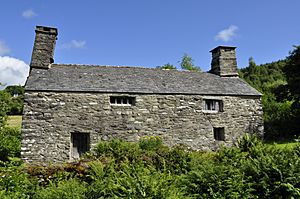Tŷ Mawr Wybrnant facts for kids
 |
|
| Location | Bro Machno, Conwy County Borough, Wales |
|---|---|
| Type | Historic house museum |
| Owner | National Trust |
Tŷ Mawr Wybrnant is a special house in the Wybrnant Valley, North Wales. It's close to the village of Betws-y-Coed in Conwy County Borough. This house is famous because it was the birthplace of Bishop William Morgan. He was the first person to translate the entire Bible into the Welsh language.
Contents
A Special Historic House
Tŷ Mawr Wybrnant is now owned by the National Trust. This is a charity that looks after historic places and natural beauty spots. The house has been carefully restored to look like it did in the 1500s.
Even though its name, Tŷ Mawr, means "Big House" in Welsh, it's quite small by today's standards. Inside, you can see old furniture from the past. There is also a unique collection of Welsh Bibles. This includes a copy of William Morgan's Bible from 1588.
Bibles from Around the World
Visitors from all over the world have donated Bibles to Tŷ Mawr Wybrnant. This means the house has Bibles in many different languages. It shows how important the Bible is to people everywhere.
Visiting Tŷ Mawr Wybrnant
The house is easiest to reach from the village of Penmachno. This village is about 4 miles from Betws-y-Coed. You can also get there from the A470 main road. This road runs between Betws-y-Coed and Dolwyddelan.
Tŷ Mawr Wybrnant was closed to visitors in early 2020. This was due to the COVID-19 pandemic. The special collection of Bibles was moved temporarily. They were displayed in a dedicated exhibition at Chirk Castle. The house has since reopened and welcomes visitors.
What's in a Name?
The house is called Tŷ Mawr Wybrnant to tell it apart from other houses named Tŷ Mawr. The word "Wybrnant" comes from the Afon Wybrnant. This is the stream that flows near the house.
The Mystery of Wybrnant
The exact meaning of "Wybrnant" isn't fully known. Nant means a small stream. Wybr is an old word for sky or cloud. However, some people think the name comes from gwiber. This Welsh word means "adder" or "viper."
There's an old legend about a gwiber. It was said to be a huge flying snake. The legend says one of these creatures lived in this very valley a long time ago.
See also
 | Emma Amos |
 | Edward Mitchell Bannister |
 | Larry D. Alexander |
 | Ernie Barnes |

